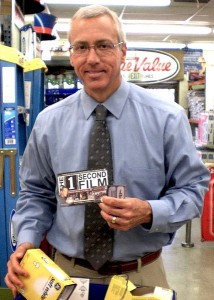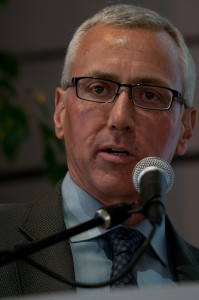Written by: Rik Sault, Contributing Writer
 Early this month, drugmaker GlaxoSmithKline pled guilty and agreed to pay a record $3 billion settlement for fraudulently promoting unapproved uses of the depression drugs Wellbutrin and Paxil, as well as the diabetes drug Avandia.
Early this month, drugmaker GlaxoSmithKline pled guilty and agreed to pay a record $3 billion settlement for fraudulently promoting unapproved uses of the depression drugs Wellbutrin and Paxil, as well as the diabetes drug Avandia.
One of the claims against Glaxo is that it used a “network of paid experts, speaking to doctors and to the press,” to tout certain uses, or benefits, of the drugs which were never approved by the Food and Drug Administration (FDA).
And Dr. Drew (Pinsky) – a board-certified internist who is firmly embedded brand includes best-selling books and three shows — was one of the hired hands peddling an unapproved use for Wellbutrin. Although he was not charged in the Glaxo case, the Justice Department’s complaint alleged that Dr. Drew received $275,000 from the company in 1999 to promote Wellbutrin for its ability to sexually enhance (or “at least not suppress”) the patient.
In the 1990s, Wellbutrin was being shadily promoted as a drug that would not only treat depression but also enhance a patient’s sex life and lead to weight loss; Glaxo’s sales reps occasionally referred to it as the “happy, horny, skinny pill,” according to the Justice Department. As part of his deal with Glaxo (which sells somewhere around $44 billion worth of drugs annually), Drew took time on ‘Loveline’ to explain that he prescribed Wellbutrin to patients suffering from depression because it might “enhance or at least not suppress sexual arousal” like other antidepressants. Dr. Drew then went on a national radio program, ‘David Essel Alive!,’ with a 34-year-old woman who claimed that she had 60 orgasms in a single night. Essel asked Drew, “What type of a medication would increase someone’s orgasmic potential, where they go from three or four to 60?” Dr. Drew’s response: Lots of antidepressants might do the trick, but he advocates Wellbutrin because it “may enhance or at least not suppress sexual arousal” as much as other drugs. A memo from Glaxo’s PR agency indicated that Dr. Drew effectively “communicated key campaign messages” on the Essel show, including that Wellbutrin “is recommended for people experiencing a loss of libido.”
Problem # 1:
In both instances, Dr. Drew endorsed Wellbutrin but failed to disclose that he was paid by the company to do so.
Problem # 2:
The FDA approved Wellbutrin for treating depression, not as a sexual enhancement. In fact, Glaxo never even received FDA approval for advertising Wellbutrin as having fewer sexual side effects than other antidepressants. Therefore, Dr. Drew was at least suggesting, if not squarely promoting, the drug for an unapproved, off-label use. And putting the name Wellbutrin next Ms. 60-in-one-night is a pretty strong endorsement, right?
Dr. Drew told CBS News that everything he said about Wellbutrin back in 1999 was both lawful and accurate based on his medical experience. However, Drew did not reveal whether he has any current financial deals with drug companies or advocacy groups. According to Glaxo and HLN, the channel that airs the “Dr. Drew” program, he recently made a deal to promote Nicorette, which is used by patients trying to quit smoking.
Many health-care reform advocates have long stressed the necessity of disclosure and transparency. The Affordable Care Act (aka Obamacare) includes a provision requiring pharmaceutical companies to disclose their payments to physicians. And the nonprofit organization ProPublica has collected such disclosures from various drug companies; its database reflects more than $760 million in payments for services such as consulting, speaking, and research.
“You deserve to know who [doctors are] working for,” says John Santa, head of the Consumer Reports Health Rating Center. “You think they’re working for you. But they might not tell you all the side effects… [and] [t]hey might not tell you the benefits of other drugs.” Many viewers rely on Dr. Drew as a competent, legitimate medical authority (and Andy Dick goes so far as to use him as a primary care physician). As such, maybe Dr. Drew should let us know about his pharmaceutical endorsement deals at or near the time he is recommending a particular product.
 It’s the end of an era for talk radio, because Dr. Drew Pinsky officially announced on the Kevin & Bean Show that he will be leaving ‘Loveline‘ after 30 years. Pinsky’s reign as a sex advice aficionado began with KROQ in 1984 during their ‘Ask a Surgeon’ segment, which later became syndicated in 1995 with Adam Carolla as its co-host. The well-known MTV version aired from 1996-2000 and featured celebrity guests who willingly answered very personal questions. Carolla left the show in 2005 amid a contract dispute but Pinksy stayed, and despite some brief bad blood, the besties quickly renewed their bond and now co-host their own podcast together. According to Drew, “The Loveline brand is still strong and perhaps we will bring it back some day. But for now, this version is ending and [he] will be focusing on all of my other projects.”
It’s the end of an era for talk radio, because Dr. Drew Pinsky officially announced on the Kevin & Bean Show that he will be leaving ‘Loveline‘ after 30 years. Pinsky’s reign as a sex advice aficionado began with KROQ in 1984 during their ‘Ask a Surgeon’ segment, which later became syndicated in 1995 with Adam Carolla as its co-host. The well-known MTV version aired from 1996-2000 and featured celebrity guests who willingly answered very personal questions. Carolla left the show in 2005 amid a contract dispute but Pinksy stayed, and despite some brief bad blood, the besties quickly renewed their bond and now co-host their own podcast together. According to Drew, “The Loveline brand is still strong and perhaps we will bring it back some day. But for now, this version is ending and [he] will be focusing on all of my other projects.”



